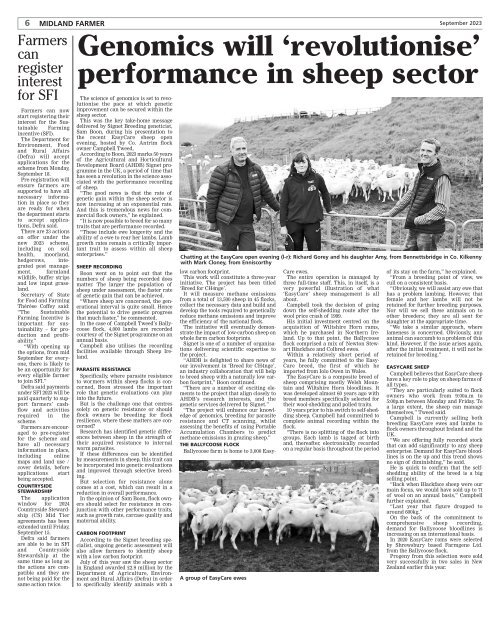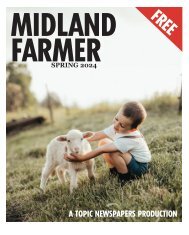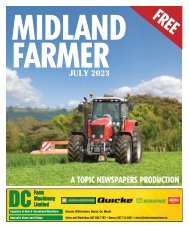You also want an ePaper? Increase the reach of your titles
YUMPU automatically turns print PDFs into web optimized ePapers that Google loves.
6 MIDLAND FARMER<br />
<strong>September</strong> <strong>2023</strong><br />
<strong>Farmer</strong>s<br />
can<br />
register<br />
interest<br />
for SFI<br />
<strong>Farmer</strong>s can now<br />
start registering their<br />
interest for the Sustainable<br />
Farming<br />
incentive (SFI).<br />
The Department for<br />
Environment, Food<br />
and Rural Affairs<br />
(Defra) will accept<br />
applications for the<br />
scheme from Monday,<br />
<strong>September</strong> 18.<br />
Pre-registration will<br />
ensure farmers are<br />
supported to have all<br />
necessary information<br />
in place so they<br />
are ready for when<br />
the department starts<br />
to accept applications,<br />
Defra said.<br />
There are 23 actions<br />
on offer under the<br />
new <strong>2023</strong> scheme,<br />
including on soil<br />
health, moorland,<br />
hedgerows, integrated<br />
pest management,<br />
farmland<br />
wildlife, buffer strips<br />
and low input grassland.<br />
Secretary of State<br />
for Food and Farming<br />
Thérèse Coffey said:<br />
“The Sustainable<br />
Farming Incentive is<br />
important for sustainability<br />
– for production<br />
and profitability.”<br />
“With opening up<br />
the options, from mid<br />
<strong>September</strong> for everyone,<br />
there is likely to<br />
be an opportunity for<br />
every eligible farmer<br />
to join SFI.”<br />
Defra said payments<br />
under SFI <strong>2023</strong> will be<br />
paid quarterly to support<br />
farmers’ cashflow<br />
and activities<br />
required in the<br />
scheme.<br />
<strong>Farmer</strong>s are encouraged<br />
to pre-register<br />
for the scheme and<br />
have all necessary<br />
information in place,<br />
including online<br />
maps and land use /<br />
cover details, before<br />
applications start<br />
being accepted.<br />
COUNTRYSIDE<br />
STEWARDSHIP<br />
The application<br />
window for 2024<br />
Countryside Stewardship<br />
(CS) Mid Tier<br />
agreements has been<br />
extended until Friday,<br />
<strong>September</strong> 15.<br />
Defra said farmers<br />
are able to be in SFI<br />
and Countryside<br />
Stewardship at the<br />
same time as long as<br />
the actions are compatible<br />
and they are<br />
not being paid for the<br />
same action twice.<br />
Genomics will ‘revolutionise’<br />
performance in sheep sector<br />
The science of genomics is set to revolutionise<br />
the pace at which genetic<br />
improvement can be secured within the<br />
sheep sector.<br />
This was the key take-home message<br />
delivered by Signet Breeding geneticist,<br />
Sam Boon, during his presentation to<br />
the recent EasyCare sheep open<br />
evening, hosted by Co. Antrim flock<br />
owner Campbell Tweed,<br />
According to Boon, <strong>2023</strong> marks 50 years<br />
of the Agricultural and Horticultural<br />
Development Board (AHDB) Signet programme<br />
in the UK, a period of time that<br />
has seen a revolution in the science associated<br />
with the performance recording<br />
of sheep.<br />
“The good news is that the rate of<br />
genetic gain within the sheep sector is<br />
now increasing at an exponential rate.<br />
And this is tremendous news for commercial<br />
flock owners,” he explained.<br />
“It is now possible to breed for so many<br />
traits that are performance recorded.<br />
“These include ewe longevity and the<br />
ability of a ewe to rear her lambs. Lamb<br />
growth rates remain a critically important<br />
trait to assess within all sheep<br />
enterprises.”<br />
SHEEP RECORDING<br />
Boon went on to point out that the<br />
numbers of sheep being recorded does<br />
matter. The larger the population of<br />
sheep under assessment, the faster rate<br />
of genetic gain that can be achieved.<br />
“Where sheep are concerned, the generational<br />
interval is quite small. Hence<br />
the potential to drive genetic progress<br />
that much faster,” he commented.<br />
In the case of Campbell Tweed’s Ballycoose<br />
flock, 4,000 lambs are recorded<br />
courtesy of the Signet programme on an<br />
annual basis.<br />
Campbell also utilises the recording<br />
facilities available through Sheep Ireland.<br />
PARASITE RESISTANCE<br />
Specifically, where parasite resistance<br />
to wormers within sheep flocks is concerned,<br />
Boon stressed the important<br />
role that genetic evaluations can play<br />
into the future.<br />
But is the challenge one that centres<br />
solely on genetic resistance or should<br />
flock owners be breeding for flock<br />
resilience, where these matters are concerned?<br />
Research has identified genetic differences<br />
between sheep in the strength of<br />
their acquired resistance to internal<br />
worm parasites.<br />
If these differences can be identified<br />
by measurements in sheep, this trait can<br />
be incorporated into genetic evaluations<br />
and improved through selective breeding.<br />
But selection for resistance alone<br />
comes at a cost, which can result in a<br />
reduction in overall performance.<br />
In the opinion of Sam Boon, flock owners<br />
should select for resistance in conjunction<br />
with other performance traits,<br />
such as growth rate, carcase quality and<br />
maternal ability.<br />
CARBON FOOTPRINT<br />
According to the Signet breeding specialist,<br />
ongoing genetic assessment will<br />
also allow farmers to identify sheep<br />
with a low carbon footprint.<br />
July of this year saw the sheep sector<br />
in England awarded £2.9 million by the<br />
Department of Agriculture, Environment<br />
and Rural Affairs (Defra) in order<br />
to specifically identify animals with a<br />
Chatting at the EasyCare open evening (l-r): Richard Gorey and his daughter Amy, from Bennettsbridge in Co. Kilkenny<br />
with Mark Cloney, from Enniscorthy<br />
low carbon footprint.<br />
This work will constitute a three-year<br />
initiative. The project has been titled<br />
‘Breed for CH4nge’.<br />
It will measure methane emissions<br />
from a total of 13,500 sheep in 45 flocks,<br />
collect the necessary data and build and<br />
develop the tools required to genetically<br />
reduce methane emissions and improve<br />
the efficiency of the national flock.<br />
The initiative will eventually demonstrate<br />
the impact of low-carbon sheep on<br />
whole farm carbon footprints.<br />
Signet is one of a number of organisations<br />
delivering scientific expertise to<br />
the project.<br />
“AHDB is delighted to share news of<br />
our involvement in ‘Breed for CH4nge’,<br />
an industry collaboration that will help<br />
to breed sheep with a naturally low carbon<br />
footprint,” Boon continued.<br />
“There are a number of exciting elements<br />
to the project that align closely to<br />
AHDB’s research interests, and the<br />
genetic services delivered by Signet.”<br />
“The project will enhance our knowledge<br />
of genomics, breeding for parasite<br />
resistance and CT scanning, whilst<br />
assessing the benefits of using Portable<br />
Accumulation Chambers to predict<br />
methane emissions in grazing sheep.”<br />
THE BALLYCOOSE FLOCK<br />
Ballycoose farm is home to 3,000 Easy-<br />
A group of EasyCare ewes<br />
Care ewes.<br />
The entire operation is managed by<br />
three full-time staff. This, in itself, is a<br />
very powerful illustration of what<br />
‘EasyCare’ sheep management is all<br />
about.<br />
Campbell took the decision of going<br />
down the self-shedding route after the<br />
wool price crash of 1999.<br />
His initial investment centred on the<br />
acquisition of Wiltshire Horn rams,<br />
which he purchased in Northern Ireland.<br />
Up to that point, the Ballycoose<br />
flock comprised a mix of Newton Stewart<br />
Blackface and Colbred ewes.<br />
Within a relatively short period of<br />
years, he fully committed to the Easy-<br />
Care breed, the first of which he<br />
imported from Iolo Owen in Wales.<br />
The EasyCare is a composite breed of<br />
sheep comprising mostly Welsh Mountain<br />
and Wiltshire Horn bloodlines. It<br />
was developed almost 60 years ago with<br />
breed members specifically selected for<br />
their wool-shedding and polled traits.<br />
10 years prior to his switch to self-shedding<br />
sheep, Campbell had committed to<br />
complete animal recording within the<br />
flock.<br />
“There is no splitting of the flock into<br />
groups. Each lamb is tagged at birth<br />
and, thereafter, electronically recorded<br />
on a regular basis throughout the period<br />
of its stay on the farm,” he explained.<br />
“From a breeding point of view, we<br />
cull on a consistent basis.<br />
“Obviously, we will assist any ewe that<br />
has a problem lambing. However, that<br />
female and her lambs will not be<br />
retained for further breeding purposes.<br />
Nor will we sell these animals on to<br />
other breeders; they are all sent for<br />
slaughter at the appropriate time.<br />
“We take a similar approach, where<br />
lameness is concerned. Obviously, any<br />
animal can succumb to a problem of this<br />
kind. However, if the issue arises again,<br />
after the initial treatment, it will not be<br />
retained for breeding.”<br />
EASYCARE SHEEP<br />
Campbell believes that EasyCare sheep<br />
have a key role to play on sheep farms of<br />
all types.<br />
“They are particularly suited to flock<br />
owners who work from 9:00a.m to<br />
5:00p.m between Monday and Friday. To<br />
a large extent, the sheep can manage<br />
themselves,” Tweed said.<br />
Campbell is currently selling both<br />
breeding EasyCare ewes and lambs to<br />
flock owners throughout Ireland and the<br />
UK.<br />
“We are offering fully recorded stock<br />
that can add significantly to any sheep<br />
enterprise. Demand for EasyCare bloodlines<br />
is on the up and this trend shows<br />
no sign of diminishing,” he said.<br />
He is quick to confirm that the selfshedding<br />
ability of the breed is a big<br />
selling point.<br />
“Back when Blackface sheep were our<br />
main focus, we would have sold up to 7t<br />
of wool on an annual basis,” Campbell<br />
further explained.<br />
“Last year that figure dropped to<br />
around 600kg.”<br />
On the back of the commitment to<br />
comprehensive sheep recording,<br />
demand for Ballycoose bloodlines is<br />
increasing on an international basis.<br />
In 2020 EasyCare rams were selected<br />
by Shrewsbury based Farmgene Ltd.<br />
from the Ballycoose flock.<br />
Progeny from this selection were sold<br />
very successfully in two sales in New<br />
Zealand earlier this year.
















